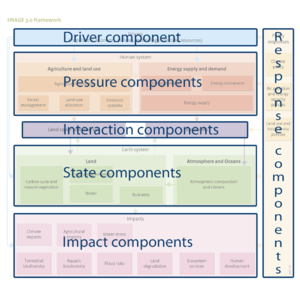Dataflow overview: Difference between revisions
Jump to navigation
Jump to search
No edit summary |
No edit summary |
||
| Line 1: | Line 1: | ||
{{OverviewTemplate | {{OverviewTemplate | ||
|Type=model | |Type=model | ||
|Overview=Framework overview; All overviews; | |Overview=Framework overview; All overviews; | ||
|Querypart=[[File:DPSIR classification.png|thumb|300px|right|alt=IMAGE framework scheme, DPSIR classification|link=IMAGE framework scheme]] | |Querypart=[[File:DPSIR classification.png|thumb|300px|right|alt=IMAGE framework scheme, DPSIR classification|link=IMAGE framework scheme]] | ||
The dataflow overviews show how the framework components are related. | |||
In the dataflow overviews the input and output variables of the components are given. Click on an element of the dataflow overview, to get more detailed information about the corresponding variable or component. | In the dataflow overviews the input and output variables of the components are given. Click on an element of the dataflow overview, to get more detailed information about the corresponding variable or component. | ||
*[[Dataflow overview - driver components]] | *[[Dataflow overview - driver components]] | ||
Revision as of 13:45, 8 January 2014
The dataflow overviews show how the framework components are related.
In the dataflow overviews the input and output variables of the components are given. Click on an element of the dataflow overview, to get more detailed information about the corresponding variable or component.
- Dataflow overview - driver components
- Dataflow overview - pressure components
- Dataflow overview - state components
- Dataflow overview - impact components
- Dataflow overview - response components
A dataflow overview of all components of the IMAGE model can be found in the following link.
Since it describes the whole model, it is the least accessible.
- Dataflow overview - all components (least accessible)
Component classification
Driver component
- Drivers
Pressure components
- Agricultural economy
- Energy conversion
- Energy demand
- Energy supply
- Forest management
- Land-use allocation
State components
- Atmospheric composition and climate
- Carbon cycle and natural vegetation
- Crops and grass
- Nutrients
- Water
Impact components
- Aquatic biodiversity
- Ecosystem services
- Flood risks
- Human development
- Land degradation
- Terrestrial biodiversity
Response components
- Air pollution and energy policies
- Climate policy
- Land and biodiversity policies
Related overviews
